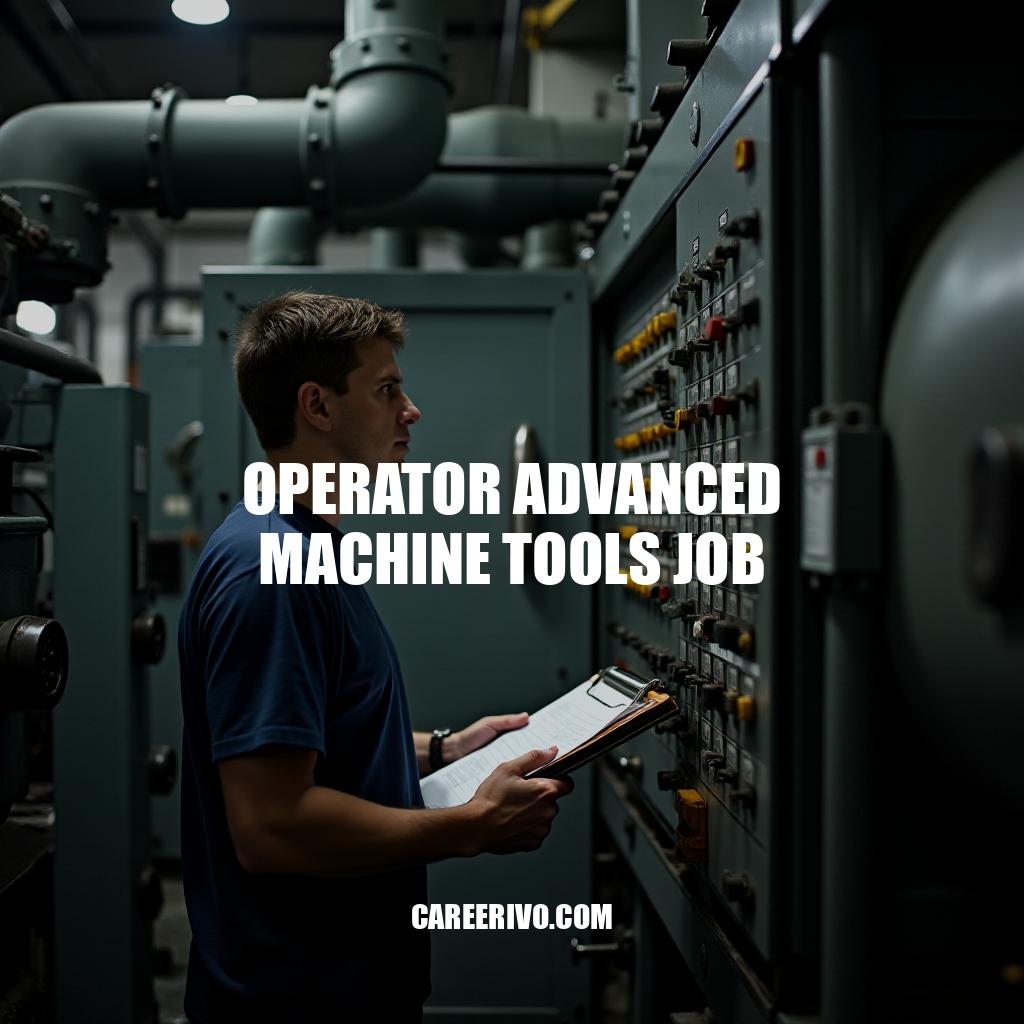
The role of a machine tool operator is super important for making sure modern manufacturing processes run smoothly and precisely. They’re responsible for operating complex machines like CNC machines, lathes, and milling equipment to meet high-quality standards.
To be successful in this job, you need to have great attention to detail, technical skills, and problem-solving abilities. Operators must read blueprints carefully, set up the machinery correctly, and watch operations closely to catch any mistakes right away.
They also need to fix mechanical or software issues quickly to avoid downtime and keep production going.
As industries rely more on automated machines, machine tool operators are becoming even more crucial. These professionals work in fields like aerospace, automotive, medical devices, and electronics where precision and consistency are a must. As manufacturing technologies improve, the demand for skilled operators is growing, making this job essential for driving innovation and excellence.
Core Responsibilities
Operating advanced machine tools requires a combination of technical expertise, precision, and adherence to strict safety guidelines. The primary tasks include:
Machine Operation
-
Setting up and calibrating CNC (Computer Numerical Control) machines to ensure accurate production.
-
Loading raw materials such as metals, plastics, or composites into the machine and verifying proper alignment.
-
Selecting and installing appropriate cutting tools, drills, or grinders based on the material and project requirements.
-
Monitoring machine performance during operation to ensure smooth production and adherence to specified measurements.
-
Adjusting speed, feed rate, and tool positions to optimize efficiency while maintaining quality standards.
Machine Maintenance
-
Conducting routine inspections of machine components, including gears, belts, and electrical connections, to prevent malfunctions.
-
Cleaning and lubricating machinery parts to minimize wear and prolong machine life.
-
Replacing worn-out or damaged tools, bearings, and motors as needed.
-
Keeping detailed maintenance records, documenting adjustments, repairs, and parts replacements.
-
Collaborating with engineers and technicians to implement upgrades or modifications that improve performance.
Troubleshooting and Error Resolution
-
Diagnosing machine malfunctions by analyzing error codes, physical defects, or performance inconsistencies.
-
Using precision instruments such as micrometers, calipers, and laser measuring tools to verify dimensional accuracy.
-
Adjusting settings or recalibrating control systems to eliminate production errors.
-
Identifying root causes of issues by conducting systematic tests and troubleshooting procedures.
-
Coordinating with supervisors, maintenance personnel, and technical support teams to resolve complex mechanical and software-related problems.
Quality Control and Safety Compliance
-
Inspecting finished products for adherence to technical drawings, specifications, and tolerances.
-
Implementing corrective actions if defects or deviations are detected.
-
Following OSHA (Occupational Safety and Health Administration) regulations, wearing protective gear, and ensuring a hazard-free work environment.
-
Maintaining proper documentation of safety inspections and compliance reports.
-
Training new operators on machine functionality, best practices, and emergency procedures.
These tasks ensure that advanced machine tools operate efficiently, producing high-quality components while maintaining a safe and controlled workspace.
The Role of an Operator of Advanced Machine Tools
The role of an operator of advanced machine tools is crucial in ensuring the smooth operation of modern manufacturing processes, driving efficiency, and producing high-quality components.
Skilled operators play a vital part in adapting to evolving technological advancements, maintaining seamless operations, and meeting strict quality standards in industries such as aerospace, automotive, medical devices, and electronics.
Key Responsibilities
Their expertise enables them to operate complex machines like CNC machines, lathes, and milling equipment with precision, attention to detail, and technical skills. By setting up and calibrating machinery, monitoring performance, and adjusting settings, operators optimize efficiency while maintaining quality standards.
Moreover, skilled machine tool operators are essential in troubleshooting and resolving mechanical or software issues quickly, minimizing downtime and ensuring continuous production. Their ability to diagnose problems, identify root causes, and implement corrective actions is critical in preventing defects and deviations from technical drawings and specifications.
Safety and Training
In addition, operators must adhere to strict safety guidelines, following OSHA regulations and maintaining a hazard-free work environment. They also play a key role in training new operators on machine functionality, best practices, and emergency procedures.
Importance of Skilled Machine Tool Operators
As manufacturing technologies continue to improve, the demand for skilled machine tool operators is growing, making this job essential for driving innovation and excellence in industrial settings. Their expertise enables companies to stay competitive, produce high-quality products, and maintain a safe and controlled workspace.


